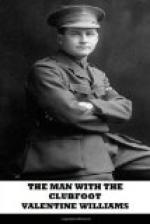I lived in daily fear of a raid at Haase’s. Why the place had escaped so long, with all that riff-raff assembled there nightly, I couldn’t imagine. It was one of those defects in German organization which puzzle the best of us at times. In the meantime, I was powerless to escape. The first thing Haase had done was to take away my papers—to send them to the police, as he explained—but he never gave them back, and when I asked for them he put me off with an excuse.
I was a virtual prisoner in the place. On my feet from morning till night, I had indeed few opportunities for going out; but once, during a slack time in the afternoon, when I broached the subject to the landlord, he refused harshly to let me out of his sight.
“The street is not healthy for you just now. You would be a danger to yourself and to all of us!” he said.
My life in that foul den was a burden to me. The living conditions were unspeakable. Otto, a pale and ill-tempered consumptive, compelled, like me, to rise in the darkness of the dawn, never washed, and his companionship in the stuffy hole where we slept was offensive beyond belief. He openly jeered at my early morning journeys out to a narrow, stinking court, where I exulted in the ice-cold water from the pump. And the food! It was only when I saw the mean victuals—the coarse and often tainted horseflesh, the unappetizing war-bread, the coffee substitute, and the rest—that I realized how Germany was suffering, though only through her poor as yet, from the British blockade. That thought used to help to overcome the nausea with which I sat down to eat.
Domestic life at Haase’s was a hell upon earth. Haase himself was a drunken bully, who made advances to every woman he met, and whose complicated intrigues with the feminine portion of his clientele led to frequent scenes with the fair-haired Hebe who presided at the bar and over his household. It was she and Otto who fared daily forth to take their places in the long queues that waited for hours with food cards outside the provision shops.
These trips seemed to tell upon her temper, which would flash out wrathfully at meal-times, when Haase began his inevitable grumbling about the food. As Otto took a malicious delight in these family scenes, I was frequently called upon to assume the role of peace-maker. More than once I intervened to save Madame from the violence she had called down upon herself by the sharpness of her tongue. She was a poor, faded creature, and the tragedy of it all was that she was in love with this degraded bully. She was grateful to me for my good offices, I think, for, though she hardly ever addressed me, her manner was always friendly.




